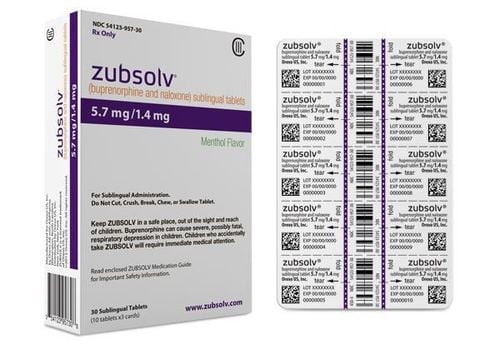This is an automatically translated article.
Alvimopan is a peripherally acting opioid antagonist used to reduce the side effects of opioid medications. So what is Alvimopan?
1. Uses of Alvimopan
Before learning about the use of Alvimopan, let's study what is Alvimopan? Alvimopan is a 12mg oral capsule that belongs to the group of peripheral opioid receptor antagonists.
Alvimopan works to reduce some of the side effects of opioid drugs (used to prevent pain after surgery). Some side effects of opioid medications (stomach pain, bloating, constipation) can slow recovery from surgery on your stomach or intestines. Alvimopan reduces side effects but will not reduce the pain-relieving effects of opioids. Alvimopan is also used to aid in the restoration of normal digestive function after a patient's partial bowel resection.
More specifically, Alvimopan helps to accelerate the recovery time of the upper and lower gastrointestinal tract after a patient's surgery, including a partial bowel resection with a primary anastomosis.
Alvimopan is only offered under a special plan, the patient will only receive 15 doses of the drug, the patient must be enrolled in the correct plan and understand the risks and benefits of Alvimopan. In addition, Alvimopan may also be used for purposes not listed in this medication guide.
Alvimopan competitively binds to the μ-opioid receptor in the gastrointestinal tract, unlike methylnaltrexone (another peripherally active μ-receptor antagonist), Alvimopan contains a quaternary amine which makes it more selective for peripheral receptors.
2. Warnings when using Alvimopan
Alvimopan should not be used if you have severe liver or kidney disease or if you have used opioids for more than 7 days in a row right before surgery. Opioid drugs include codeine, fentanyl, hydrocodone, meperidine, methadone, morphine, oxycodone, and many others.
Some people have experienced heart attacks with long-term use of Alvimopan in clinical studies, however it is not clear whether Alvimopan is the actual cause of heart attacks
Alvimopan should not be used Use longer than 7 days after surgery.
Before taking Alvimopan, tell your doctor if you have ever:
Have liver or kidney disease; Heart disease or previous heart attack; Gastrointestinal obstruction (stomach or intestinal obstruction); Surgery to remove the colon or ileostomy; Pancreatic disorders ; Have recently used any opioid medications. Researchers still don't know if Alvimopan will harm an unborn baby, so it's important to talk to your doctor if you're pregnant or planning to become pregnant. In addition, it may not be safe to breastfeed while using Alvimopan.
3. How is Alvimopan used?
Alvimopan is only used in the hospital for a short time. Patients will receive their first dose of Alvimopan before surgery, followed by an additional dose twice daily for up to 7 days. Alvimopan should not be used for longer than 7 days after surgery. Specific dose of Alvimopan:
Initial dose: 12mg Alvimopan orally ONE time, 30 minutes - 5 hours before surgery; Maintenance dose: 12 mg Alvimopan, orally twice a day, starting on the day after surgery; Maximum dose: 15 doses; Duration of treatment: 7 days OR until discharge.
4. Alvimopan side effects
Get emergency medical help if the patient has any of the following signs of an allergic reaction: hives, difficulty breathing, swelling of the face, lips, tongue, or throat. Some people have had a heart attack while taking Alvimopan long-term so call your doctor right away if you have heart attack symptoms such as:
Chest pain; Pain spreading to the jaw or shoulder; Feeling anxious, nauseated, sweating; Common side effects of Alvimopan may include indigestion. Patients are more likely to experience unpleasant stomach effects if any opioid medication is taken right before surgery.
5. What drugs affect Alvimopan?
Other drugs may affect Alvimopan , including prescription and over-the-counter medicines, vitamins and herbs, patients should tell their doctor about all current medications and any any medicine you have just started or stopped using. It is especially important to let the doctor know if the patient has used opioid medication within the past 7 days. Opioids are commonly used to treat moderate to severe pain, and some prescription cough medicines also contain active ingredients in the opioid class.
Please dial HOTLINE for more information or register for an appointment HERE. Download MyVinmec app to make appointments faster and to manage your bookings easily.













